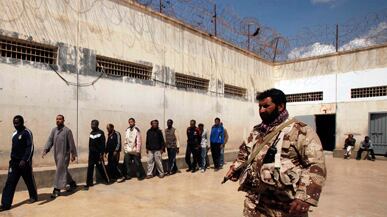The coalition jet streaked around the column of Muammar Gaddafi’s troops on a desolate highway in eastern Libya. “I thought it was a Libyan jet,” said Salah Khalifa, a 30-year-old soldier among the ground troops. He was unworried until the aircraft suddenly dove down and blasted the soldiers with bombs. Khalifa blacked out. When he came to he saw that shrapnel had sliced up his left leg. Then he looked around him. “I saw people cut in half. I saw bodies with the head missing. There was a lot of destruction,” said Khalifa, who is now being held at a military base in Benghazi along with Nizar Ali, 28, a fellow soldier who was hit by shrapnel in the right leg during the same attack by the coalition on Sunday morning.

They are among roughly 50 detainees at the base, some of whom were captured during recent military operations, and the camp is closely guarded. When I visited on Thursday, a handful of soldiers barreled out of the front gates in two pickup trucks, ripping off rounds as they went to investigate a suspicious car around the corner. What sounded like a firefight then broke out near the prison.
A representative from Human Rights Watch, who also visited the prison on Thursday, raised concerns about the way in which the rebels are handling the detainees. “There’s no centralized authority. Everybody makes it up as they go along,” said Peter Bouckaert, emergencies director for the group. “Many can just disappear.”
ADVERTISEMENT
A Gambian man, accused of being a Gaddafi loyalist, pointed to his blood-splattered shirt when I asked him about abuse. A guard stood nearby and it appeared the Gambian was afraid to speak. But he did say that his wife had been raped when armed men came to detain him.
Khalifa and Ali, who both had bandaged wounds, said they had been treated well. The two had been kept in the same room, which was covered with grubby mattresses and reeking of urine and stale cigarette smoke. There were half-eaten aluminum tins of pasta and sauce next to their mattresses.
Their account of how they came to the Benghazi prison camp offers a glimpse of the inner workings of Gaddafi’s military. Both men say they were members of a guard unit that’s normally stationed hundreds of miles away near the Tunisian border. About a week ago, they were called up to join the fight against the rebels in the east. They were first taken to Sert, Gaddafi’s hometown, where their military unit was joined up with hundreds of plainclothes militiamen from Libya and Chad. The militiamen were being armed up with new AK-47s at the base. “They told us we are going to fight Al Qaeda and mercenaries, who came to take over the country,” says Ali, a skinny young man with black hair who winces in pain as he talks.
A Gambian man accused of being a Gaddafi loyalist pointed to his blood-splattered shirt when I asked him about abuse.
Last Tuesday, they headed out from the military base in Sert in a convoy of some 150 civilian cars and 15 military vehicles, the troops comprising about 1,000 fighters altogether. They were headed for Umm Saad, a town on the border with Egypt, and their objective was to shut the border down. En route, they passed through Bin Jawad, Ras Lanuf, Brega and Ajdabiya – all towns where the rebels had fought and lost control. The civilian cars took the lead in the convoy in order to dupe any rebels they might see on the highway. During the journey, the regular military units were not allowed to interact with the plainclothes militiamen, and Khalifa and Ali both claim they did not take part in any fighting along the way.
After the coalition airstrike on their convoy, which was camped out about 140 miles northeast of Ajdabiya, the two were in a daze. An ambulance from within their convoy picked them up as well as a third wounded soldier from their truck. They turned around and headed back toward Ajdabiya when a jet swooped low again. “The ambulance driver jumped out and left us there!” Khalifa says, throwing up his hands in disbelief. The driver eventually dropped them off at the edge of the Ajdabiya hospital, which had been retaken by the rebels at the time, and drove away. The rebels then transferred them to the prison in Benghazi.
The speed with which Khalifa and Ali’s unit blazed through the desert is a clear indication of how important it was to the regime to seal off and control the east before any U.N.-sanctioned military action. There are other signs as well. Last Friday, Mutassim, one of Gaddafi’s sons, showed up at the frontlines at Ajdabiya, according to a brigadier detained at the prison who asked that his name not be cited because of safety concerns for his family. The brigadier, who surrendered to the rebels during the military assault on Benghazi on Saturday, also pointed out that the militiamen accompanying the military were wild and uncontrollable. “They drive everywhere – on the left, on the right. And they’re shooting all the time,” he said.
Khalifa and Ali both say they hope to see their families soon. But with Gaddafi’s troops still hunkered down in Ajdabiya, it’s clear that the regime has not given up the fight.
Babak Dehghanpisheh is Newsweek's Beirut Bureau Chief. He's been covering the Middle East for Newsweek since 2001.






